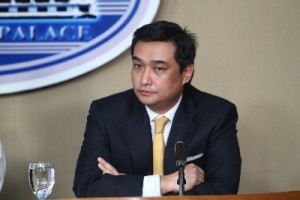Palace admits gov’t should speak with one voice on dispute with China
MANILA, Philippines—As it grappled with the repercussions of Senator Antonio Trillanes IV’s actions, Malacañang on Friday admitted that it has learned a simple, albeit painful, lesson: The government should speak with one voice in resolving its territorial dispute with China.
Trillanes, the government’s back-channel negotiator with China over the disputed Panatag Shoal in the West Philippine Sea, had purportedly made statements to Ambassador to China Sonia Brady that contradicted the government’s policy. Brady’s notes of the meeting had been made public.
“The lesson we’ve learned is that it is important for the government, when we face the outside world—in this case China—to speak with one voice,” Strategic Communication Secretary Ricky Carandang said by phone Friday morning.
“It’s important that regardless of what we’re doing, what approaches we’re making, we speak with one voice,” he said.
Otherwise, the party on the other side of the table would be confused, he said.
Carandang declined to comment on whether Trillanes’ series of talks with Chinese officials in Manila and Beijing did more harm than good, especially in the face of the controversy set off by the junior senator’s purported statements to Brady regarding Panatag Shoal, or Bajo de Masinloc, internationally known as Scarborough Shoal, off the coast of Zambales.
Based on Brady’s notes, disclosed by Senate President Juan Ponce Enrile on the floor last Wednesday, Trillanes purportedly stated that “no one” cares about Panatag Shoal, among others.
“Trillanes’ job at the time was to find a way to ease tension by opening a dialogue with Chinese officials, which he did,” Carandang said. “He was not there to recommend policy, or do anything more than to ease the tension.”
Some saw Trillanes’ one-on-one meetings with Chinese officials as diverging from the multi-lateral engagement espoused by Foreign Affairs Secretary Albert Del Rosario with the Association of Southeast Asian Nations members, including countries also claiming parts of the disputed Spratly Islands.
While tangling with Trillanes, who bolted the Senate majority last Wednesday, Enrile disclosed several items in Brady’s notes that he said showed Trillanes was working for Beijing. Trillanes volunteered to help defuse the stand-off between Philippine and Chinese ships at the shoal in April.
Enrile said the August 17 notes purported to show that Trillanes stated that nobody cared about Panatag Shoal; that the Chinese wanted the Philippines to tone down its rhetoric on its incursion of the shoal; that Trillanes suspected that the United States was involved in the tension, and that Del Rosario was “committing treason.”
The notes also indicated that Trillanes was “protecting the Chinese,” was alarmist and accused Del Rosario of “creating a war event;” that Trillanes asked businessman Manuel V. Pangilinan to advise his friend, Del Rosario, to “keep quiet;” that Trillanes said that the Philippines “cannot enforce coastal protection;” that Trillanes boasted that he was able to make 40 Chinese ships leave the shoal; and that Trillanes volunteered to become the “direct channel” between Beijing and Malacañang.
Carandang said it was President Aquino’s discretion whether to keep Trillanes as back-room negotiator with China.
“Whether or not his job is finished is up to the President to determine,” he said.
Aquino has indicated he would meet with Trillanes, who had bickered with Del Rosario over their conflicting approaches to the Panatag Shoal row, but there’s no specific date yet, officials said.
In fairness to Trillanes, Carandang said the senator did have “high-level contacts” in China, and “was able to discuss ways to defuse tension with them.”
Asked if Trillanes contributed to the de-escalation of tension, Carandang said: “That’s not something I’m ready to answer. The assessment is better made by people directly dealing with the issue.”
To date, Carandang said, the territorial dispute with China over the West Philippine Sea lingers.
The West Philippine Sea, historically a part of the South China Sea, comprises the maritime areas on the western side of the Philippines, where the disputed Panatag Shoal and Kalayaan Island Group area located.
“The Chinese ships are still there,” he added. “The tension has been reduced, but the issue remains. We’re hopeful that we can continue to talk to the Chinese to resolve the issue. The issue of claims over Scarborough Shoal remains. We’re hoping to continue to dialogue with them to help resolve the issue.”
Despite the controversy set off by Trillanes’ back-channeling efforts and purported statements to Brady, Malacañang wasn’t ruling out future backdoor negotiations with China.
“If it makes sense and will be helpful, we will do that. It would depend on a case to case basis. If we feel opening channels informally would help, we’d do that. It depends on the situation,” Carandang said. “It’s not a question of whether informal back-channeling is effective or not, but whether the parameters of the back-channeling are clear.’’
Newly appointed Interior Secretary Manuel Roxas II, whom Aquino dispatched to China on Thursday to meet with leader-in-waiting Vice President Xi Jinping, could build on the gains of the de-escalated tension, Carandang said.
“This is one of the reasons why Secretary Roxas went there. There’s a chance for Roxas to build on this easing of tensions. We want to take that chance,” Carandang said.
Roxas, named special envoy to the five-day China-Asean Expo in China’s southern city of Nanning, hoped to meet Xi to relay Aquino’s message to Chinese President Hu Jintao in light of the two presidents’ aborted meeting early this month on the sidelines of the Asia Pacific Economic Cooperation leaders’ summit in Russia.
“He’s been asked for this particular event. He may or may not be asked to do it again, and that would be determined by the President or the Secretary of Foreign Affairs,” Carandang said.















